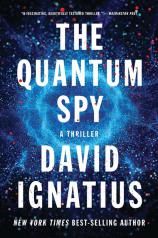The Quantum Spy
Review
The Quantum Spy
There’s nothing more satisfying than a fast-paced thriller with a heart, and THE QUANTUM SPY delivers on both fronts. David Ignatius, the respected columnist for the Washington Post and a talking head on MSNBC, has written 10 thrillers, many with an international theme. His latest takes the reader to Asia and back, and features a cast that includes Chinese spies and a Chinese American CIA operative who becomes entangled with them.
Ignatius has woven into this story of rival factions in both countries a subplot about the race to create a quantum computer. This gives the novel a sense of timeliness, but also makes the reader appreciate how critical success is to each country. The author explains why, in terms that are clear enough to be understood by the casual reader, who learns how it is being developed, who is funding it, and the extraordinary feats it can achieve.
"The novel’s plot twists feel real, as though the author had uncovered these very stories while plying his journalistic trade."
However, what makes this such a good read is that Ignatius has developed characters who go beyond the caricature of the wily, cynical spy. The book opens in Seattle, where “Mr. Green” is talking to the head of a quantum computing company in which the government has invested. It then cuts to Singapore, where a Chinese scientist is being pressured to work for the CIA or risk exposure for the money he’s been hiding in offshore accounts.
There we meet Harris Chang, a Chinese American ex-Army Ranger who is helping squeeze the scientist. It doesn’t hurt that he speaks some Chinese and can move about in Asia without drawing attention to himself. Chang is a real patriot --- until he begins to doubt his government’s and his own loyalties. The Chinese have no compunction about exploiting Chang’s doubts, and in so doing, they force him to think about the duality of ethnicity and upbringing.
Ignatius keeps the action going as factions in China try to exploit American spies, and the CIA works to find out which double agent --- known only by the name “Rukou” (The Doorway) --- is helping them. There are secrets that, if shared, could change the course of each country and its respective dominance and stability. The novel’s plot twists feel real, as though the author had uncovered these very stories while plying his journalistic trade. The reader comes away with a sense of how much higher the stakes are now that our computing capabilities have increased to the point where they pose as great a threat as nuclear arms. It’s a chilling prospect.
Reviewed by Lorraine W. Shanley on November 22, 2017




